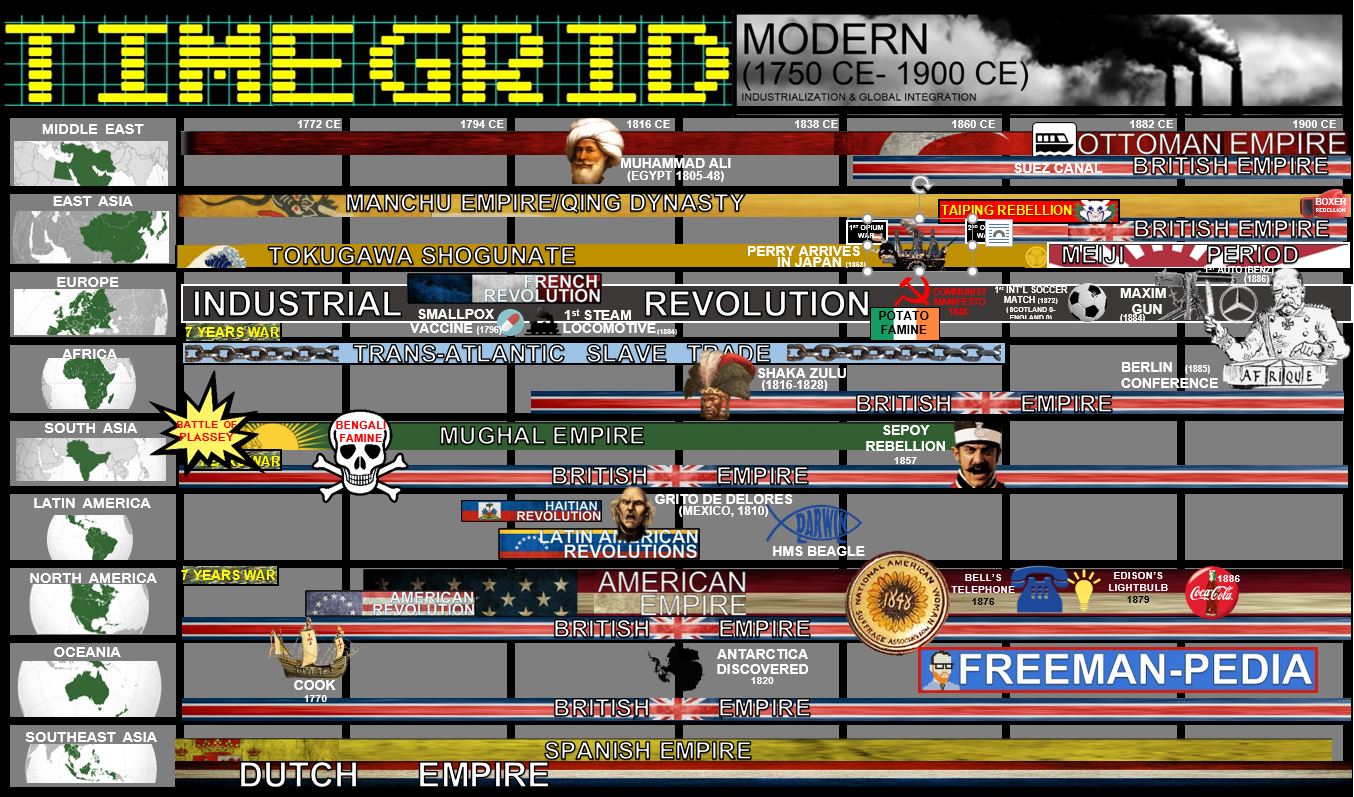The College Board has broken down the History of the World into six distinct periods (FOUNDATIONS, CLASSICAL, POST-CLASSICAL, EARLY-MODERN, MODERN, CONTEMPORARY. Why did they divide them this way? The following images should give you the basis for understanding the divisions.
In the beginning, there was FOUNDATIONS. This is only 5% of the test. You're kinda wasting your time by reading this. But, if you're still here... Foundations goes up until 600 CE. This period is dominated by the change from Hunter-Forager to Farming. It's one of the biggest changes ever. But, there are some other things. Out of Africa Theory, Writing, Religion (belief systems like Hinduism and Judaism), Culture, Politics, etc. 600 BCE is the end point because it predates the major belief systems (besides the Vedic and Hebrew) as well as the major large empires. Imagine this period as setting the stage for the rise of the Classical period
The Classical period picks up where history takes off. This is where you start to actually be able to recognize certain regions of the planet based on their beliefs, architecture, government structure, societies, etc. The Classical period sees the rise of Persia, Greece, Rome, Mauryan & Guptan India as well as the beginning of the Chinese story that will ALWAYS be important (this isn't an AP Chinese History course, but often gets called that. The problem is: CHINA IS ALMOST ALWAYS IN THE TOP FIVE MOST IMPORTANT THINGS IN EACH PERIOD).
The Post Classical period is marked 600-1450 for three main reasons. First, all those Classy Empires are not gone (I hear you Byzantines... I know you still exist). Second, Islam arrives. It is the last major world religion to show up, but is definitely one of the most important. Third, those Americas are still sitting over there by themselves. That truly defines the PERIODIZATION of this period (why 600? why 1450?). Tons of other stuff happens too, China rebounds quite nicely, Mongols take over just about everything, trade routes intensify, blah blah blah. But, for Periodization... It's Bye-Bye Classies, Hello Muslims, and Not Yet America...
Ever wonder when World History starts being truly 'World' History? This is that period. The arrival of the Western Europeans in the New World (and the Old World, for that matter) really changes the way the world looks and interacts. Don't sleep on the major land empires! They truly dominate things (Ottomans, Mughals, Ming/Qing China). But that all changes in the NEXT PERIOD. The Columbian Exchange and all that goes with it is such a big deal, it kinda gets its own period=THE EARLY MODERN PERIOD. So, for PERIODIZATION= Starts with the fall of the Byzantines (Bye, Rome). Also starts, with Zhenghe shutting things down in China opening the way for the Europeans to move into the Indian Ocean (as well as Columbus et al in 1492). This period ends with Kings and Empires dominating. This is one of those periods that shuts down in the year it shuts down because of what comes next (Industrialization and Revolution).
Ahhh, Modernity. This is the period where, by the end, you could go back in time and kinda relate to what's going on (Industry, Democracy, School, etc.) This period picks up with two of its largest things happening simultaneously. First, the Industrial Revolution. First, in Britain, then Western Europe and the US; then... all over. This is a slow burn. Just like the Neolithic Revolution, this took a while. Farmers didn't just throw their pitchforks in the air and run into a factory. So, Industrialization spans this period... (and the next). The other big deal that starts pretty early is Political Revolutions... Including the one that did it FIRST... That did it BEST... is of course, the UNITED STATES OF AMERICA! But, others quickly followed based on Enlightenment principles. The other big thing going on in this period is Imperialism. You've Industrialized? Great. You probably need some raw materials. Why not use your super-dominant industrialized military to go and take them from people in Africa and Asia? That really wraps up this period (Also, Global Migrations are really starting to happen on a scale that we can call them Global Migrations).
Finally, the period we were all born in. The Contemporary Period (which was originally 1914-present) covers the 20th century and beyond. More rapid technological and industrial change occurred in this period than maybe all others combined. Scientific & technological innovation dominate this period. Try to explain what you're reading (and how you're reading it ) to someone in 1900. Impossible. Beyond Technology, the World Wars (WWI, WWII, and the Cold War) mark the major conflicts from 1914-1991. Along with all of this is the ever-increasing Globalization and Interdependency that has come to dominate the 21st century.





















